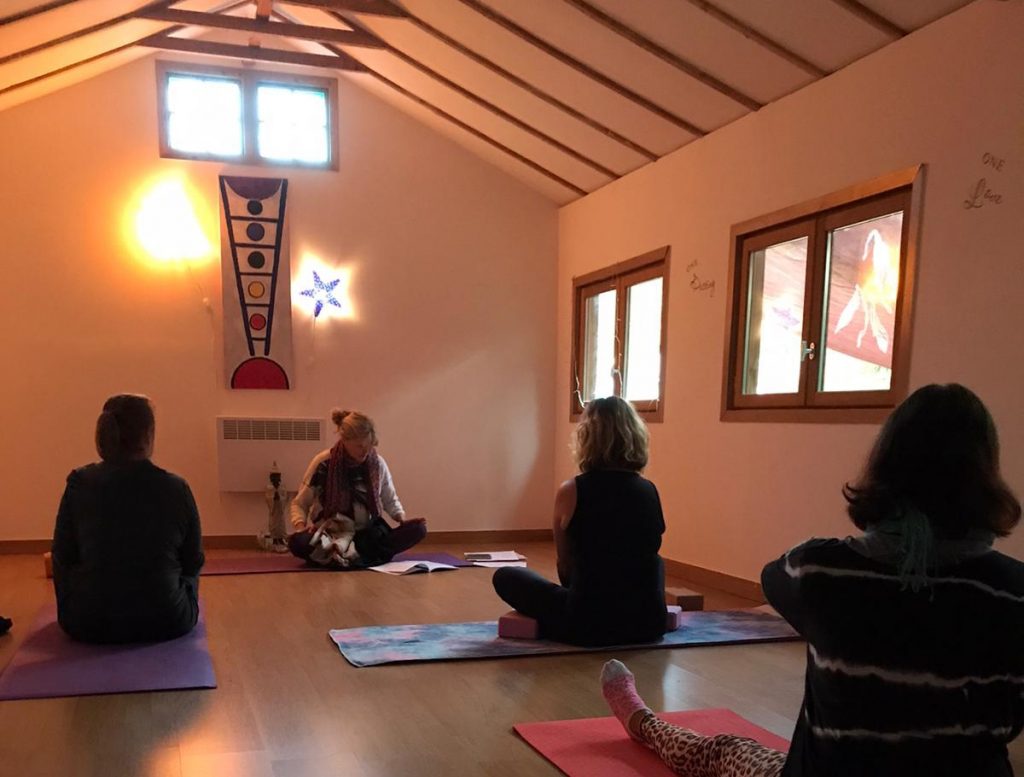It’s Monday afternoon, I was going to start writing this article over the weekend, but then ended up trying to sort out a plumbing problem, so spent a good chunk of the time crouching with my head under the kitchen sink, grunting and swearing as I dismantled the u-bend and stuck a long wire coil down the pipes to see what was going on and try to dislodge the blockage. A lot of gunge came out – what the hell was all that? – but I couldn’t fix the problem. The mammoth toe or whatever was down there remained there. I choked back tears. Aarghh, stressful.
Of course, a lot of things are stressful, especially right now (you know what I’m talking about), but sometimes it’s the comparatively small things which can tip you over the edge. Now my problem is fixed, thanks to a plumber, and I can get on with this article. Far worse things have happened to me over the last year but I’m coping, most of the time, and I think yoga really helps.
A bit over 12 years ago, I started going to a lunchtime Hatha yoga class at work. Just an hour every week, but it became a highlight and then a kind of fulcrum of the week. By this time I was in my forties, a parent, going through the usual worries related to work/motherhood/relationship/money, along with those ‘why don’t I have time to myself?’ and ‘what am I doing with my life?’ thoughts (which have evolved but not disappeared). So, I was quite stressed, as many people are, but taking the time to practise yoga felt good. I always came out feeling better than when I went in, and yoga (in a class, on my own, on Zoom) continues to sustain me.
So, this is my understanding, based on personal experience and reading, of the ways in which yoga can help us make the most of our lives and cope with stressful situations. It can also help with other, often related, conditions which affect us physically, mentally and emotionally, such as anxiety, anger, depression and grief. There is also growing evidence that it can help with chronic pain. I don’t claim yoga is a miracle cure, or the answer to everything, and I would advise anyone who has a mental or physical health problem (or is pregnant) to see a qualified medical practitioner or counsellor before taking up yoga. If they agree it’s a good idea (they might recommend a specialised class if a regular class is not suitable for you) it’s time to unroll the yoga mat. But before we get started, what do we mean by ‘stress’?

Eustress or ‘good’ stress
Stress is a physical and mental reaction to situations which we find challenging or even threatening, the ‘fight or flight’ response governed by our sympathetic nervous system. So, the first distinction to make is between the situation and how you react. In an extreme situation – the mammoth is gaining on you – being primed for action could save your life, or allow you to save someone else, and it can help you put on a peak performance whether you are about to compete in a sporting event, take to the stage, complete a dissertation or give an important presentation at work. The heart pumping and adrenaline kick can be a positive boost when you need to use all your reserves to rise to the challenge and, in non-yogic terms, kick ass. Afterwards you can stand down from high alert, at least until the next time. But, like all highs, challenge stress can become addictive for some people, whether related to sport and exercise, work, or risky behaviour such as gambling – and if you can’t turn it off until you really need it, if it becomes a compulsion, you may start to suffer from stress-related symptoms affecting your mental and physical health.
Bad stress
In my last job our newly promoted manager held weekly team meetings which were a kind of antithesis of the yoga class. She always began by making a point of how stressed she was and asked us if we were too. The correct answer was yes; being stressed about everything meant you were taking your job seriously. But, besides the fact that rushing around like the White Rabbit in Alice in Wonderland surely can’t be good for productivity (if we are stressed by our work all the time then the workload is too much or we are not working efficiently), it can’t be good for us either.
Negative stress is the kind of stress that doesn’t really have any upsides (distress). It’s what we feel when we are struggling to cope with competing demands on us, all clamouring for our time, attention and energy. We can’t distinguish between what’s important and what is trivial because everything is a trigger, it’s too little sleep, waking up tired, being unable to concentrate, snacking because we need something to keep us going and we missed breakfast, taking out our frustrations on partners or children, feeling bad about ourselves and even fearful that if we relax for a moment everything will fall apart. It might seem ‘normal’ but it’s a vicious circle which depletes our energy reserves and if unchecked can make us seriously ill.
In fact, when we are continually stressed:
“our blood vessels stay constricted, and our heart rate and blood pressure remain elevated, increasing our likelihood of suffering a stroke or heart attack. We’re at risk for developing ulcers, infertility, chronic pain, and dementia. Chronically high levels of cortisol can lead to anxiety, depression, fatigue, weight gain, and digestive problems. When threat response stress becomes chronic, our immune system suffers as well. We have higher levels of systemic inflammation, putting us at risk for chronic conditions like cardiovascular disease and type 2 diabetes…” (1)



